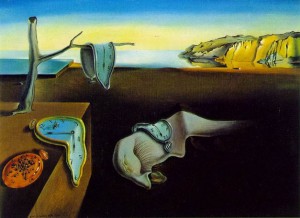From John’s Gospel:
Jesus said: “Your ancestor Abraham rejoiced that he would see my day; he saw it and was glad.” Then the Jews said to him, “You are not yet fifty years old, and have you seen Abraham?” Jesus said to them, “Very truly, I tell you, before Abraham was, I am.” So they picked up stones to throw at him, but Jesus hid himself and went out of the temple.
(From the Daily Office Lectionary – John 8:56-59 – September 5, 2012)
 I’ve been sort of mulling this over all day. It’s one of those interesting mixed-tense things; Jesus uses the past tense for Abraham (“Abraham was”), but the present tense for himself (“I am”), while placing his presence before Abraham’s past. I think what he’s trying to do here his describe eternity. That’s not easy to do!
I’ve been sort of mulling this over all day. It’s one of those interesting mixed-tense things; Jesus uses the past tense for Abraham (“Abraham was”), but the present tense for himself (“I am”), while placing his presence before Abraham’s past. I think what he’s trying to do here his describe eternity. That’s not easy to do!
There was a sort of “pop theology” popular when I was getting my education for ordained ministry which made a distinction between two “kinds” of time: chronos (one of the Greek words for time) and kairos (another Greek word for time). The former is described as the former refers to our experience of sequential time; it is “human time.” It’s the time Steve Miller sang about with the lyric, “Time keeps on slippin’, slippin’, slippin’ into the future.” (Fly Like an Eagle) Kairos signifies a time of indeterminate nature in which something special happens; it is “God’s time.” It is, I suppose, eternity.
There’s a similar difference between “eternity” and “forever”, and I think it’s the same difference. “Forever” is an extension of sequential time. It’s the way in which time, as we experience, just keeps going on and on and on. But “eternity”, if it is kairos, is somehow outside of the linear sequence of our temporal experience. Eternity encompasses linear time. It was “before” time; it will be “after” time; it is “outside” of time. Forever might come to an end; it might slip into the future to point where it stops. Eternity or kairos, however, doesn’t, can’t, won’t – the concept of an end of eternity is meaningless.
Kairos or eternity, however, is also not the cyclical time of the Eastern religions. It isn’t the wheel of time or kalachakra of Hinduism and Buddhism. The problem (in my estimation) of that concept is that it makes existence seem a bit like a continuous-loop tape recording that plays over and over again, but never gets worn out. Nothing can be avoided; nothing can be changed. There is no final destination and, ultimately, there is no purpose to anything. As the French writer and filmmaker, Jean Cocteau said, “Nothing ever gets anywhere. The earth keeps turning round and gets nowhere.”
Cocteau, continued, however, “The moment is the only thing that counts,” and this (I believe) is where Jesus’ understanding and statement of who he was and is led him and leads us. When asked to teach his disciples to pray, Jesus taught them to focus on the moment: “Give us today our daily bread.” (Matt. 6:11; Luke 11:3) In the sermon on the mount he said, “Do not worry about tomorrow, for tomorrow will bring worries of its own. Today’s trouble is enough for today.” (Matt. 6:34) Rather than worry about one’s clothing or food or drink, he encouraged his followers to “strive first for the kingdom of God and his righteousness.” (v. 33) Be focused on the moment, the eternal now, eternity, kairos.
Ideas of past and future are just baggage. It has been said that depression results from trying to live in the past; anxiety comes from trying to live in the future. Psychologist Abraham Maslow said, “The ability to be in the present moment is a major component of mental wellness.” As Jesus made clear, it is a major component of spiritual wellness, too. Jesus ministry, among other things, was to bring eternity “into” time, kairos into chronos: “Before Abraham was, I am” is a statement of now, the eternal now, kairos.
====================
Father Funston is the rector of St. Paul’s Episcopal Church, Medina, Ohio.



Leave a Reply